Travel Agency Report: Analysis of Challenges and Future Strategies
VerifiedAdded on 2020/02/23
|7
|1560
|1542
Report
AI Summary
This report examines the challenges faced by travel agencies in the tourism and hospitality industry, focusing on the impact of the internet, information communication technology (ICT), and online booking systems. It analyzes how these factors have diminished the role of traditional travel agents, leading to issues such as reduced client bases, increased competition from online platforms, and the need for technological upgrades. The report highlights the importance of competitiveness and quality management, as well as the need for travel agencies to adapt to environmental management practices. Recommendations include upgrading online infrastructure, restoring e-commerce travel agencies, implementing customer loyalty programs, and adopting innovative marketing strategies to regain market share and customer confidence. The report concludes that travel agencies must embrace ICT and internet technologies to remain integral to the tourism sector and overcome the challenges posed by the evolving digital landscape.
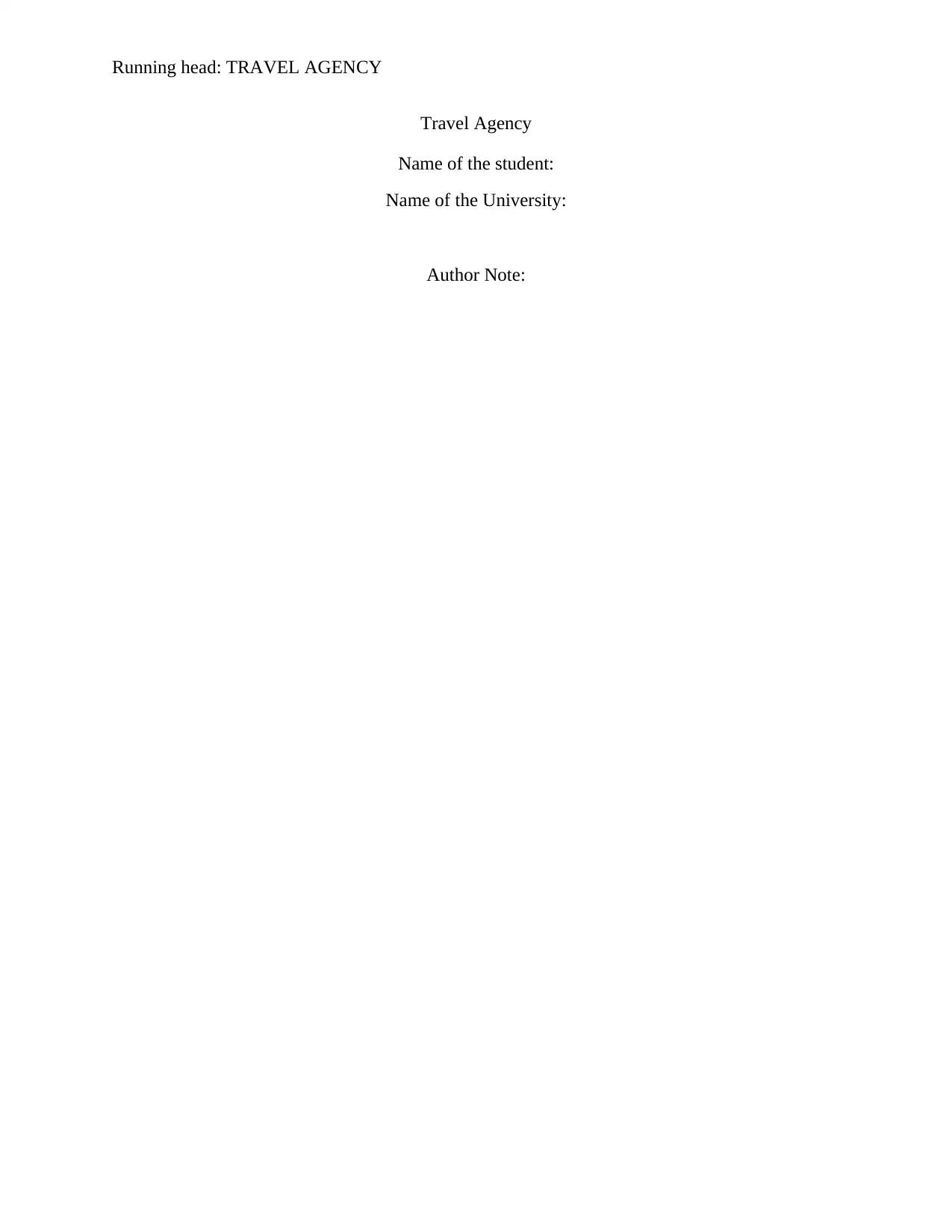
Running head: TRAVEL AGENCY
Travel Agency
Name of the student:
Name of the University:
Author Note:
Travel Agency
Name of the student:
Name of the University:
Author Note:
Paraphrase This Document
Need a fresh take? Get an instant paraphrase of this document with our AI Paraphraser
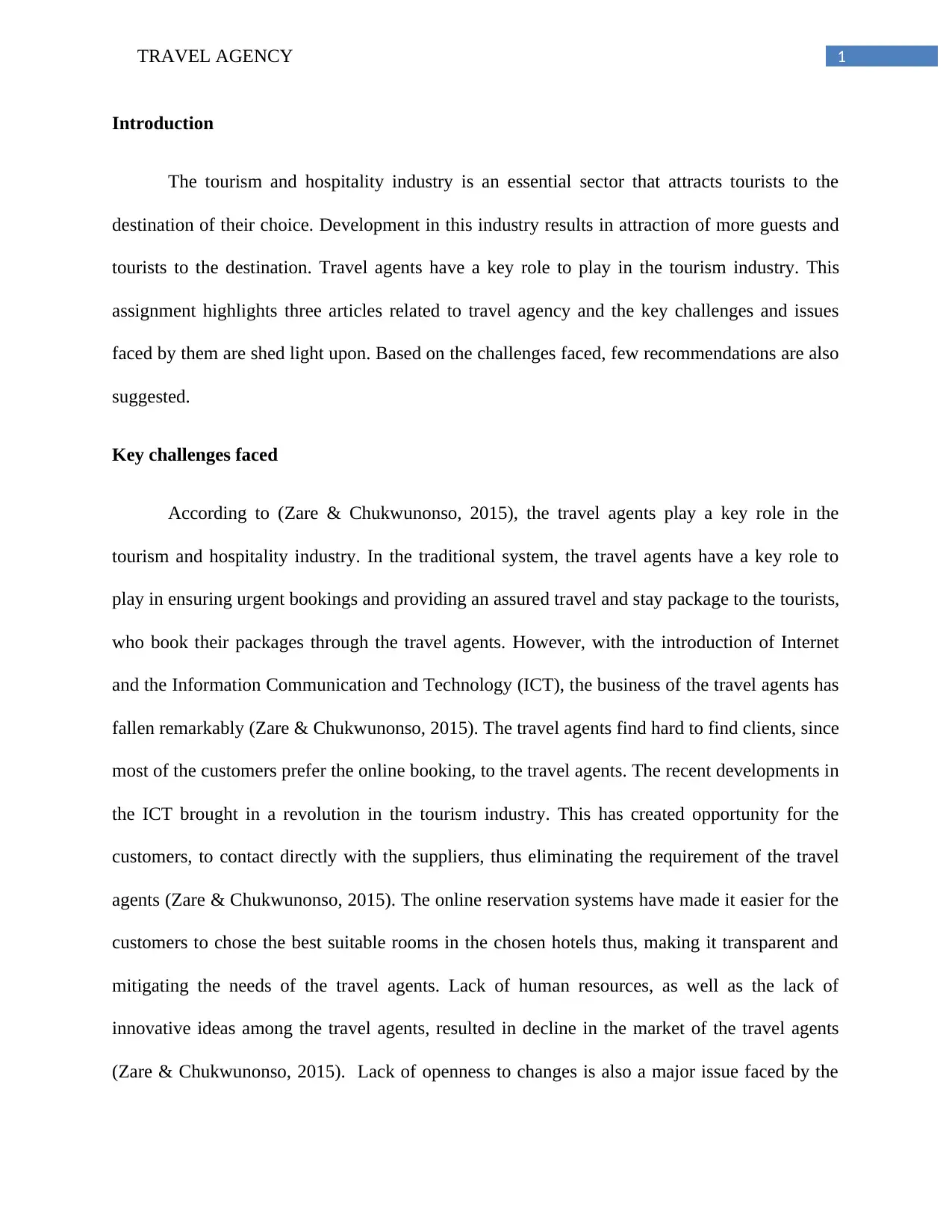
1TRAVEL AGENCY
Introduction
The tourism and hospitality industry is an essential sector that attracts tourists to the
destination of their choice. Development in this industry results in attraction of more guests and
tourists to the destination. Travel agents have a key role to play in the tourism industry. This
assignment highlights three articles related to travel agency and the key challenges and issues
faced by them are shed light upon. Based on the challenges faced, few recommendations are also
suggested.
Key challenges faced
According to (Zare & Chukwunonso, 2015), the travel agents play a key role in the
tourism and hospitality industry. In the traditional system, the travel agents have a key role to
play in ensuring urgent bookings and providing an assured travel and stay package to the tourists,
who book their packages through the travel agents. However, with the introduction of Internet
and the Information Communication and Technology (ICT), the business of the travel agents has
fallen remarkably (Zare & Chukwunonso, 2015). The travel agents find hard to find clients, since
most of the customers prefer the online booking, to the travel agents. The recent developments in
the ICT brought in a revolution in the tourism industry. This has created opportunity for the
customers, to contact directly with the suppliers, thus eliminating the requirement of the travel
agents (Zare & Chukwunonso, 2015). The online reservation systems have made it easier for the
customers to chose the best suitable rooms in the chosen hotels thus, making it transparent and
mitigating the needs of the travel agents. Lack of human resources, as well as the lack of
innovative ideas among the travel agents, resulted in decline in the market of the travel agents
(Zare & Chukwunonso, 2015). Lack of openness to changes is also a major issue faced by the
Introduction
The tourism and hospitality industry is an essential sector that attracts tourists to the
destination of their choice. Development in this industry results in attraction of more guests and
tourists to the destination. Travel agents have a key role to play in the tourism industry. This
assignment highlights three articles related to travel agency and the key challenges and issues
faced by them are shed light upon. Based on the challenges faced, few recommendations are also
suggested.
Key challenges faced
According to (Zare & Chukwunonso, 2015), the travel agents play a key role in the
tourism and hospitality industry. In the traditional system, the travel agents have a key role to
play in ensuring urgent bookings and providing an assured travel and stay package to the tourists,
who book their packages through the travel agents. However, with the introduction of Internet
and the Information Communication and Technology (ICT), the business of the travel agents has
fallen remarkably (Zare & Chukwunonso, 2015). The travel agents find hard to find clients, since
most of the customers prefer the online booking, to the travel agents. The recent developments in
the ICT brought in a revolution in the tourism industry. This has created opportunity for the
customers, to contact directly with the suppliers, thus eliminating the requirement of the travel
agents (Zare & Chukwunonso, 2015). The online reservation systems have made it easier for the
customers to chose the best suitable rooms in the chosen hotels thus, making it transparent and
mitigating the needs of the travel agents. Lack of human resources, as well as the lack of
innovative ideas among the travel agents, resulted in decline in the market of the travel agents
(Zare & Chukwunonso, 2015). Lack of openness to changes is also a major issue faced by the
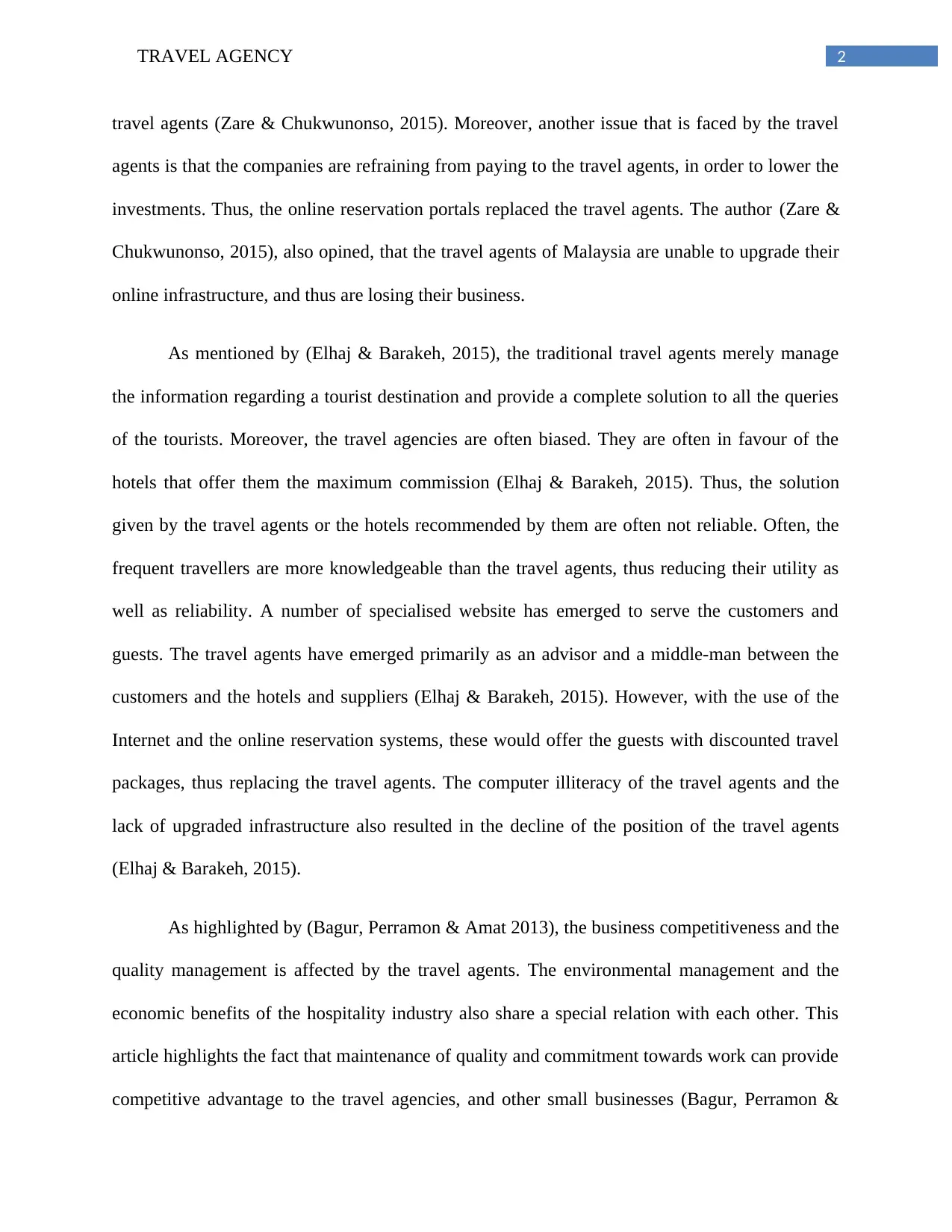
2TRAVEL AGENCY
travel agents (Zare & Chukwunonso, 2015). Moreover, another issue that is faced by the travel
agents is that the companies are refraining from paying to the travel agents, in order to lower the
investments. Thus, the online reservation portals replaced the travel agents. The author (Zare &
Chukwunonso, 2015), also opined, that the travel agents of Malaysia are unable to upgrade their
online infrastructure, and thus are losing their business.
As mentioned by (Elhaj & Barakeh, 2015), the traditional travel agents merely manage
the information regarding a tourist destination and provide a complete solution to all the queries
of the tourists. Moreover, the travel agencies are often biased. They are often in favour of the
hotels that offer them the maximum commission (Elhaj & Barakeh, 2015). Thus, the solution
given by the travel agents or the hotels recommended by them are often not reliable. Often, the
frequent travellers are more knowledgeable than the travel agents, thus reducing their utility as
well as reliability. A number of specialised website has emerged to serve the customers and
guests. The travel agents have emerged primarily as an advisor and a middle-man between the
customers and the hotels and suppliers (Elhaj & Barakeh, 2015). However, with the use of the
Internet and the online reservation systems, these would offer the guests with discounted travel
packages, thus replacing the travel agents. The computer illiteracy of the travel agents and the
lack of upgraded infrastructure also resulted in the decline of the position of the travel agents
(Elhaj & Barakeh, 2015).
As highlighted by (Bagur, Perramon & Amat 2013), the business competitiveness and the
quality management is affected by the travel agents. The environmental management and the
economic benefits of the hospitality industry also share a special relation with each other. This
article highlights the fact that maintenance of quality and commitment towards work can provide
competitive advantage to the travel agencies, and other small businesses (Bagur, Perramon &
travel agents (Zare & Chukwunonso, 2015). Moreover, another issue that is faced by the travel
agents is that the companies are refraining from paying to the travel agents, in order to lower the
investments. Thus, the online reservation portals replaced the travel agents. The author (Zare &
Chukwunonso, 2015), also opined, that the travel agents of Malaysia are unable to upgrade their
online infrastructure, and thus are losing their business.
As mentioned by (Elhaj & Barakeh, 2015), the traditional travel agents merely manage
the information regarding a tourist destination and provide a complete solution to all the queries
of the tourists. Moreover, the travel agencies are often biased. They are often in favour of the
hotels that offer them the maximum commission (Elhaj & Barakeh, 2015). Thus, the solution
given by the travel agents or the hotels recommended by them are often not reliable. Often, the
frequent travellers are more knowledgeable than the travel agents, thus reducing their utility as
well as reliability. A number of specialised website has emerged to serve the customers and
guests. The travel agents have emerged primarily as an advisor and a middle-man between the
customers and the hotels and suppliers (Elhaj & Barakeh, 2015). However, with the use of the
Internet and the online reservation systems, these would offer the guests with discounted travel
packages, thus replacing the travel agents. The computer illiteracy of the travel agents and the
lack of upgraded infrastructure also resulted in the decline of the position of the travel agents
(Elhaj & Barakeh, 2015).
As highlighted by (Bagur, Perramon & Amat 2013), the business competitiveness and the
quality management is affected by the travel agents. The environmental management and the
economic benefits of the hospitality industry also share a special relation with each other. This
article highlights the fact that maintenance of quality and commitment towards work can provide
competitive advantage to the travel agencies, and other small businesses (Bagur, Perramon &
⊘ This is a preview!⊘
Do you want full access?
Subscribe today to unlock all pages.

Trusted by 1+ million students worldwide
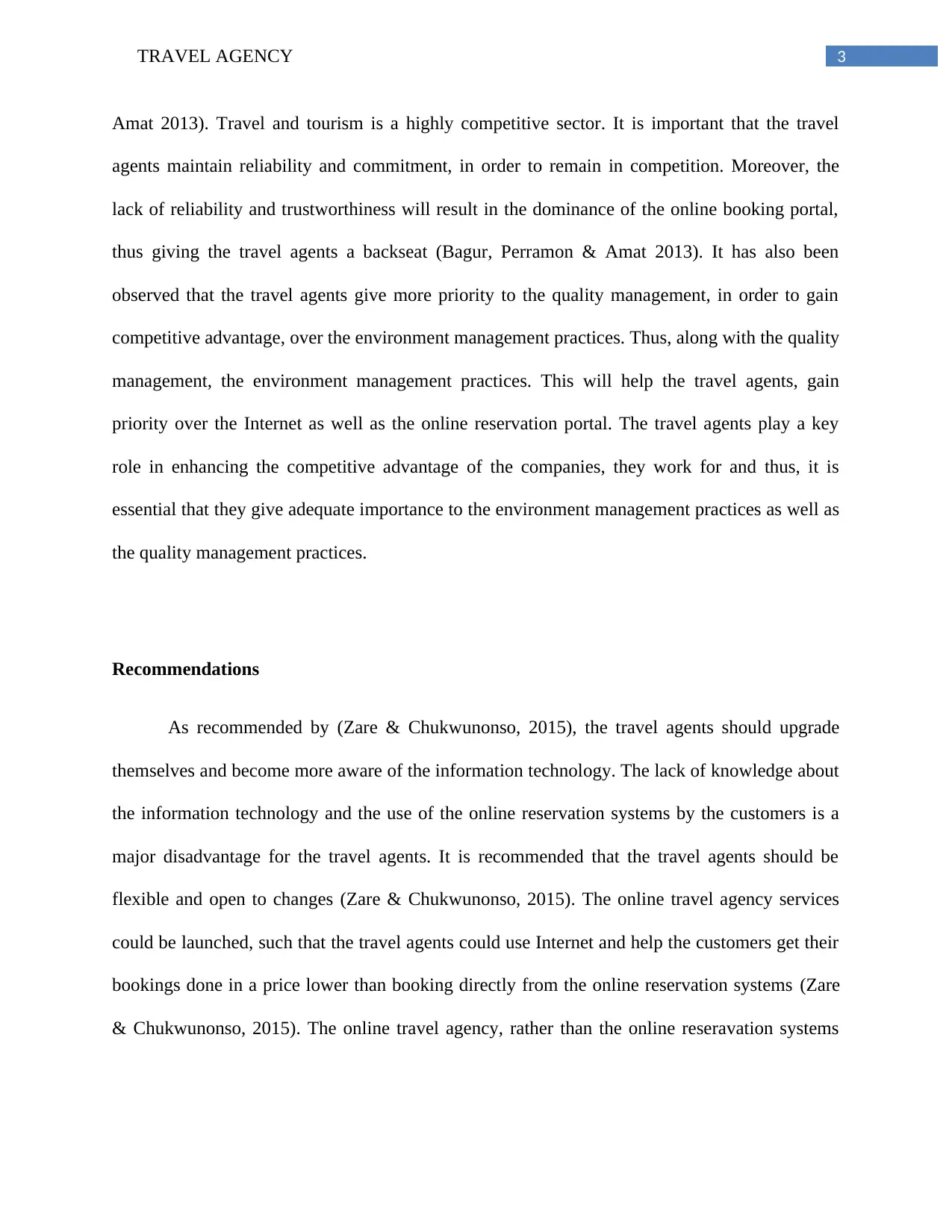
3TRAVEL AGENCY
Amat 2013). Travel and tourism is a highly competitive sector. It is important that the travel
agents maintain reliability and commitment, in order to remain in competition. Moreover, the
lack of reliability and trustworthiness will result in the dominance of the online booking portal,
thus giving the travel agents a backseat (Bagur, Perramon & Amat 2013). It has also been
observed that the travel agents give more priority to the quality management, in order to gain
competitive advantage, over the environment management practices. Thus, along with the quality
management, the environment management practices. This will help the travel agents, gain
priority over the Internet as well as the online reservation portal. The travel agents play a key
role in enhancing the competitive advantage of the companies, they work for and thus, it is
essential that they give adequate importance to the environment management practices as well as
the quality management practices.
Recommendations
As recommended by (Zare & Chukwunonso, 2015), the travel agents should upgrade
themselves and become more aware of the information technology. The lack of knowledge about
the information technology and the use of the online reservation systems by the customers is a
major disadvantage for the travel agents. It is recommended that the travel agents should be
flexible and open to changes (Zare & Chukwunonso, 2015). The online travel agency services
could be launched, such that the travel agents could use Internet and help the customers get their
bookings done in a price lower than booking directly from the online reservation systems (Zare
& Chukwunonso, 2015). The online travel agency, rather than the online reseravation systems
Amat 2013). Travel and tourism is a highly competitive sector. It is important that the travel
agents maintain reliability and commitment, in order to remain in competition. Moreover, the
lack of reliability and trustworthiness will result in the dominance of the online booking portal,
thus giving the travel agents a backseat (Bagur, Perramon & Amat 2013). It has also been
observed that the travel agents give more priority to the quality management, in order to gain
competitive advantage, over the environment management practices. Thus, along with the quality
management, the environment management practices. This will help the travel agents, gain
priority over the Internet as well as the online reservation portal. The travel agents play a key
role in enhancing the competitive advantage of the companies, they work for and thus, it is
essential that they give adequate importance to the environment management practices as well as
the quality management practices.
Recommendations
As recommended by (Zare & Chukwunonso, 2015), the travel agents should upgrade
themselves and become more aware of the information technology. The lack of knowledge about
the information technology and the use of the online reservation systems by the customers is a
major disadvantage for the travel agents. It is recommended that the travel agents should be
flexible and open to changes (Zare & Chukwunonso, 2015). The online travel agency services
could be launched, such that the travel agents could use Internet and help the customers get their
bookings done in a price lower than booking directly from the online reservation systems (Zare
& Chukwunonso, 2015). The online travel agency, rather than the online reseravation systems
Paraphrase This Document
Need a fresh take? Get an instant paraphrase of this document with our AI Paraphraser
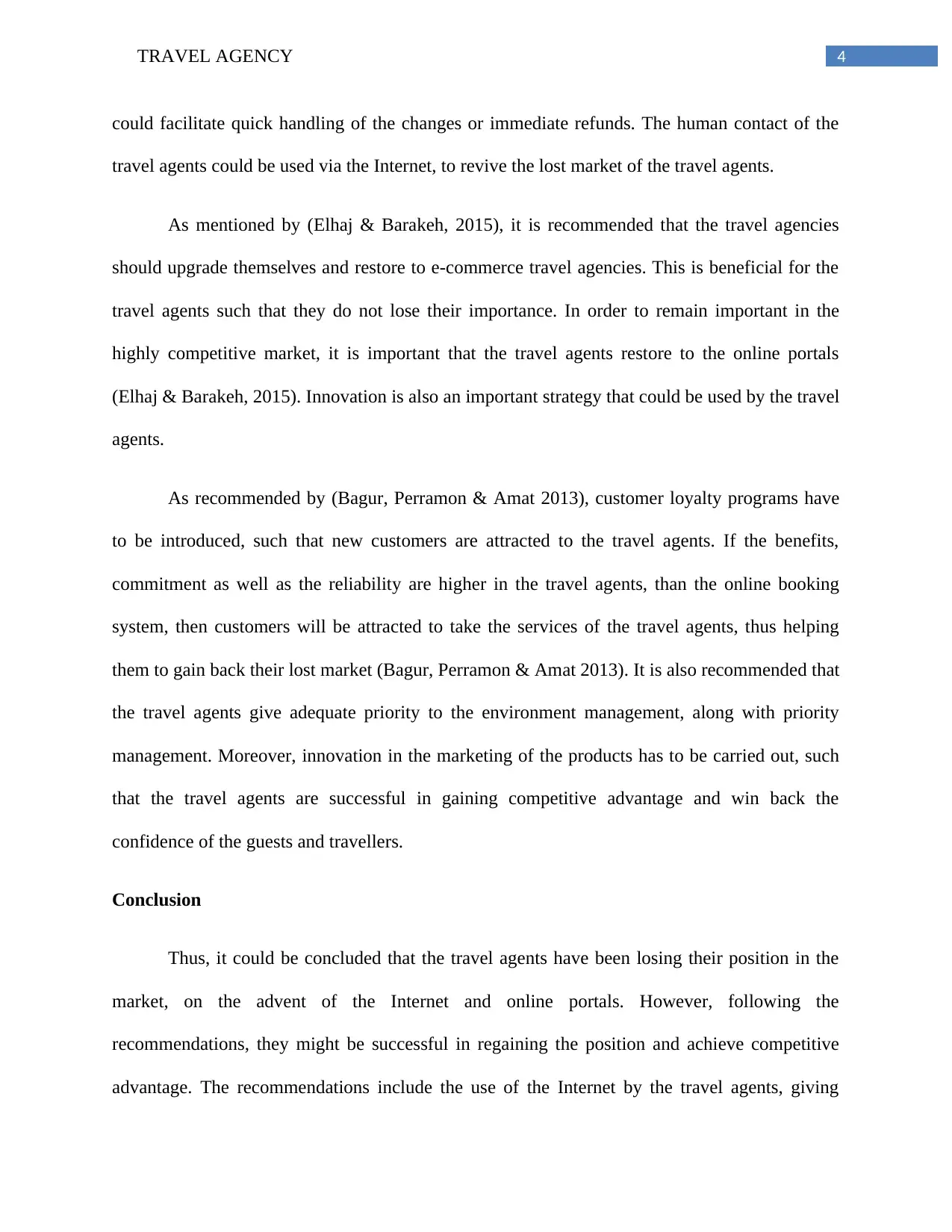
4TRAVEL AGENCY
could facilitate quick handling of the changes or immediate refunds. The human contact of the
travel agents could be used via the Internet, to revive the lost market of the travel agents.
As mentioned by (Elhaj & Barakeh, 2015), it is recommended that the travel agencies
should upgrade themselves and restore to e-commerce travel agencies. This is beneficial for the
travel agents such that they do not lose their importance. In order to remain important in the
highly competitive market, it is important that the travel agents restore to the online portals
(Elhaj & Barakeh, 2015). Innovation is also an important strategy that could be used by the travel
agents.
As recommended by (Bagur, Perramon & Amat 2013), customer loyalty programs have
to be introduced, such that new customers are attracted to the travel agents. If the benefits,
commitment as well as the reliability are higher in the travel agents, than the online booking
system, then customers will be attracted to take the services of the travel agents, thus helping
them to gain back their lost market (Bagur, Perramon & Amat 2013). It is also recommended that
the travel agents give adequate priority to the environment management, along with priority
management. Moreover, innovation in the marketing of the products has to be carried out, such
that the travel agents are successful in gaining competitive advantage and win back the
confidence of the guests and travellers.
Conclusion
Thus, it could be concluded that the travel agents have been losing their position in the
market, on the advent of the Internet and online portals. However, following the
recommendations, they might be successful in regaining the position and achieve competitive
advantage. The recommendations include the use of the Internet by the travel agents, giving
could facilitate quick handling of the changes or immediate refunds. The human contact of the
travel agents could be used via the Internet, to revive the lost market of the travel agents.
As mentioned by (Elhaj & Barakeh, 2015), it is recommended that the travel agencies
should upgrade themselves and restore to e-commerce travel agencies. This is beneficial for the
travel agents such that they do not lose their importance. In order to remain important in the
highly competitive market, it is important that the travel agents restore to the online portals
(Elhaj & Barakeh, 2015). Innovation is also an important strategy that could be used by the travel
agents.
As recommended by (Bagur, Perramon & Amat 2013), customer loyalty programs have
to be introduced, such that new customers are attracted to the travel agents. If the benefits,
commitment as well as the reliability are higher in the travel agents, than the online booking
system, then customers will be attracted to take the services of the travel agents, thus helping
them to gain back their lost market (Bagur, Perramon & Amat 2013). It is also recommended that
the travel agents give adequate priority to the environment management, along with priority
management. Moreover, innovation in the marketing of the products has to be carried out, such
that the travel agents are successful in gaining competitive advantage and win back the
confidence of the guests and travellers.
Conclusion
Thus, it could be concluded that the travel agents have been losing their position in the
market, on the advent of the Internet and online portals. However, following the
recommendations, they might be successful in regaining the position and achieve competitive
advantage. The recommendations include the use of the Internet by the travel agents, giving
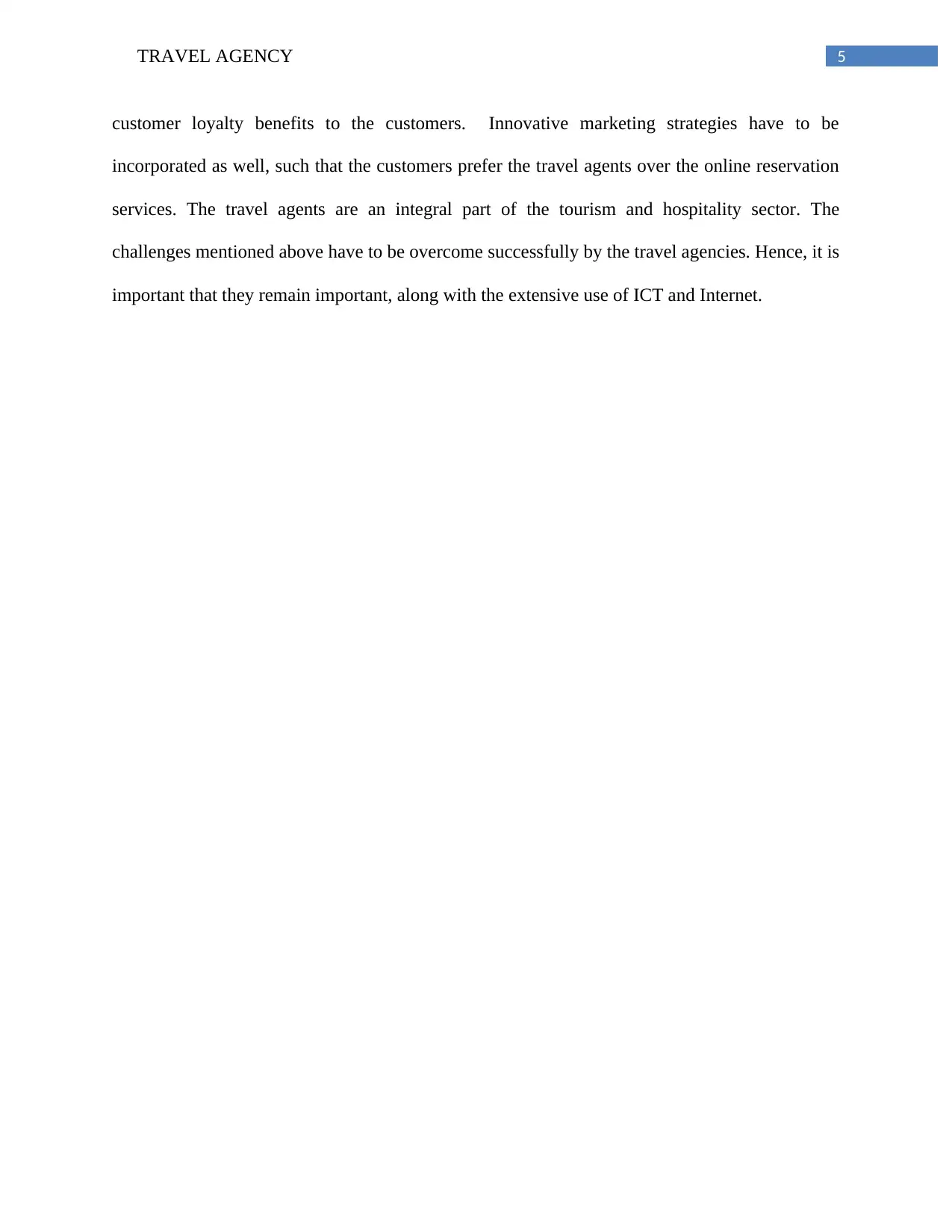
5TRAVEL AGENCY
customer loyalty benefits to the customers. Innovative marketing strategies have to be
incorporated as well, such that the customers prefer the travel agents over the online reservation
services. The travel agents are an integral part of the tourism and hospitality sector. The
challenges mentioned above have to be overcome successfully by the travel agencies. Hence, it is
important that they remain important, along with the extensive use of ICT and Internet.
customer loyalty benefits to the customers. Innovative marketing strategies have to be
incorporated as well, such that the customers prefer the travel agents over the online reservation
services. The travel agents are an integral part of the tourism and hospitality sector. The
challenges mentioned above have to be overcome successfully by the travel agencies. Hence, it is
important that they remain important, along with the extensive use of ICT and Internet.
⊘ This is a preview!⊘
Do you want full access?
Subscribe today to unlock all pages.

Trusted by 1+ million students worldwide
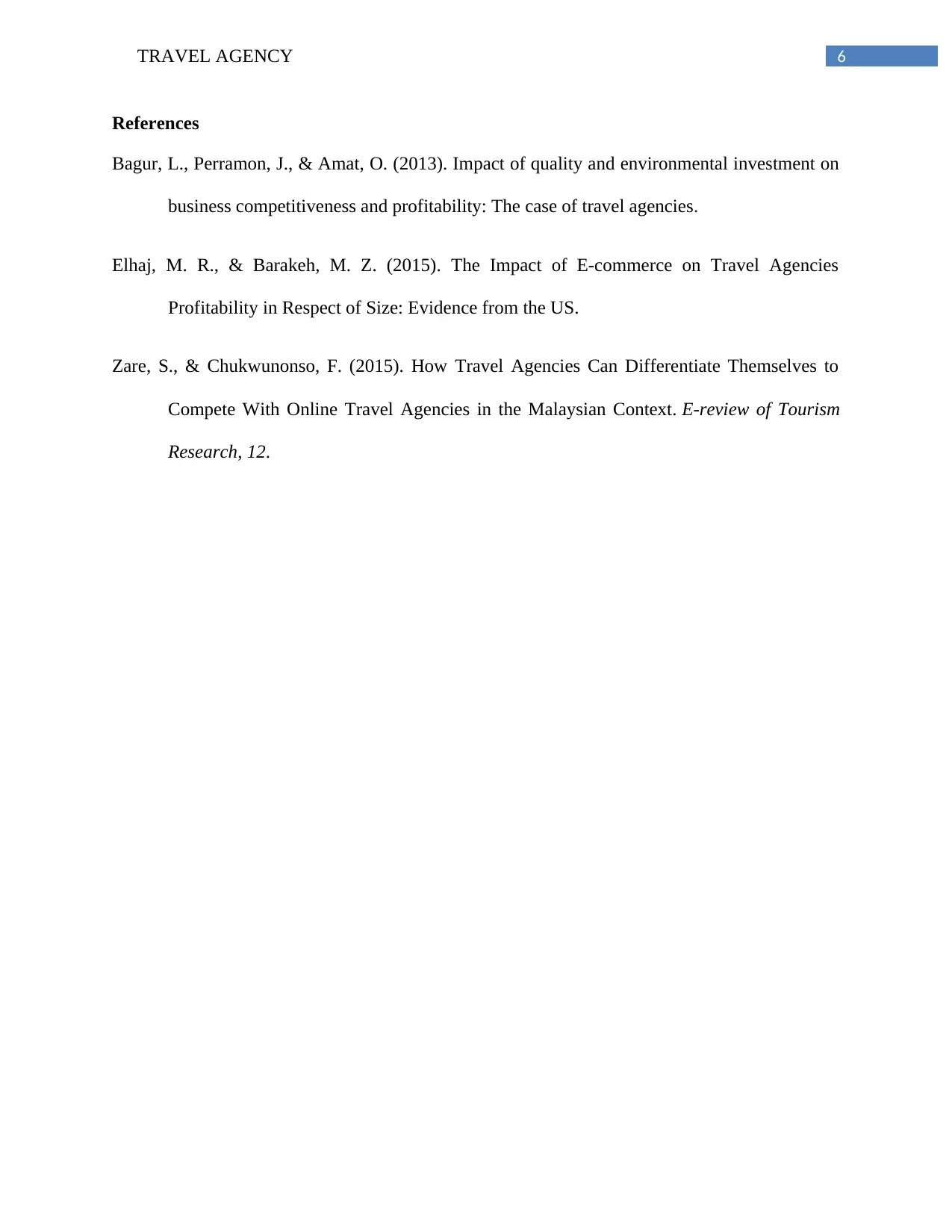
6TRAVEL AGENCY
References
Bagur, L., Perramon, J., & Amat, O. (2013). Impact of quality and environmental investment on
business competitiveness and profitability: The case of travel agencies.
Elhaj, M. R., & Barakeh, M. Z. (2015). The Impact of E-commerce on Travel Agencies
Profitability in Respect of Size: Evidence from the US.
Zare, S., & Chukwunonso, F. (2015). How Travel Agencies Can Differentiate Themselves to
Compete With Online Travel Agencies in the Malaysian Context. E-review of Tourism
Research, 12.
References
Bagur, L., Perramon, J., & Amat, O. (2013). Impact of quality and environmental investment on
business competitiveness and profitability: The case of travel agencies.
Elhaj, M. R., & Barakeh, M. Z. (2015). The Impact of E-commerce on Travel Agencies
Profitability in Respect of Size: Evidence from the US.
Zare, S., & Chukwunonso, F. (2015). How Travel Agencies Can Differentiate Themselves to
Compete With Online Travel Agencies in the Malaysian Context. E-review of Tourism
Research, 12.
1 out of 7
Related Documents
Your All-in-One AI-Powered Toolkit for Academic Success.
+13062052269
info@desklib.com
Available 24*7 on WhatsApp / Email
![[object Object]](/_next/static/media/star-bottom.7253800d.svg)
Unlock your academic potential
Copyright © 2020–2026 A2Z Services. All Rights Reserved. Developed and managed by ZUCOL.




